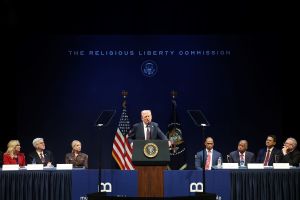Herman Cain Gets Defensive Over 999 Tax Plan
WASHINGTON – Republican presidential candidate Herman Cain defended his 999 tax plan against growing criticism Friday at the Values Voter Summit, telling naysayers to address him directly rather than make calculations of their own.
Cain said his 999 plan – 9 percent corporate tax, 9 percent personal income tax and 9 percent national sales tax – is a "bold" solution to the nation's weak economy and those who didn't agree had likely tampered with the plan's formula.
He stressed the plan is revenue neutral and would generate more income as businesses grow. It will also save the nation $430 billion dollars, he asserted.
However, many question whether the 999 plan will generate revenue comparable to the current tax code.
The Washington Times tested the plan in a September editorial using personal income figures generated by the University of New Mexico's Bureau of Business and Economic Research and retail figures compiled by the U.S. Census. The publication was able to generate $1.1 trillion a year in personal income taxes and $380 billion in retail taxes using the 999 tax model. Combining those figures with the Times' estimate that a 9 percent corporate income tax rate would generate $270 billion, it guessed that the 999 plan would raise $1.8 trillion. The government currently takes in $2.16 trillion in taxes, according to Politifact.
He told supporters at the Value Voter Summit, "When you see reports talking about [Cain's tax plan] won't do this and won't do they have changed the assumptions."
Cain's spokesman J.D. Gordon assured that Cain's plan has been vetted by a number of advisers.
"Mr. Cain's idea was the 999 – the name, the concept, the idea – and he worked with Rich (Lowery, his economic advisor) to get it done [and] put the policy on paper. Then there's an economic advisory council that they have," Gordon told The Christian Post.
But media reports describe Lowery as a wealth manager and not an economist.
Gordon remained tight lipped about the members of Cain's council and informal economic network except to say they are, "very well-known political experts, economic experts and foreign policy experts that advise him privately." He said the group also includes a former ambassador to the United Nations.
When asked why he would not reveal that names of those mystery advisers, he cited a variety of reasons including, "they don't want to declare a candidate until the race is decided."
However, the Cain campaign remains sure of the plan's effectiveness.
"He had [the 999 plan] scored and the estimate from the scoring is that it would create 6 million jobs because the whole concept is that corporations could grow," said Gordon.
Cain emphasized that plan is meant to give businesses certainty and foster an environment ideal for job creation and economic growth.
Still, critics of Cain's plan are also critical of the plan's national sales taxes. There is currently no national sales tax. States do, however, charge local sales taxes.
Rachelle Bernstein, a vice president and tax counsel at lobbyist group National Retail Federation, said "An additional tax on consumer spending will negatively impact that already weak demand."
Gordon responded that consumers will be cushioned by the reduction in the personal income tax.
However, he did not answer questions regarding why Cain would create a new federal tax at a time when GOP party leaders are bent on cutting taxes and government regulation.



























